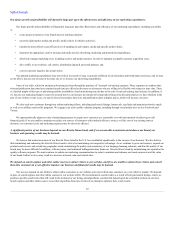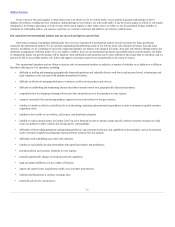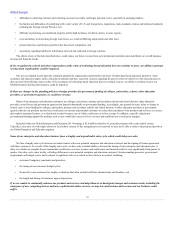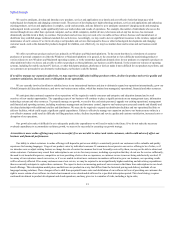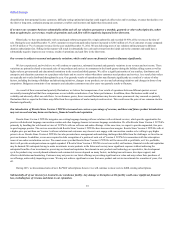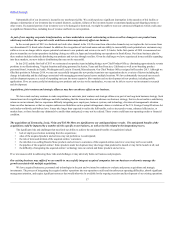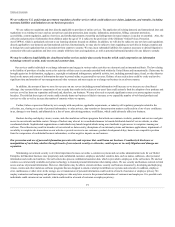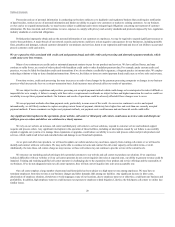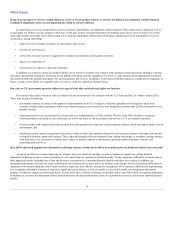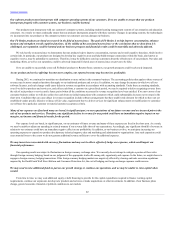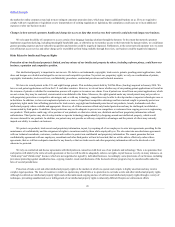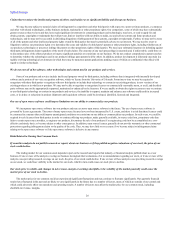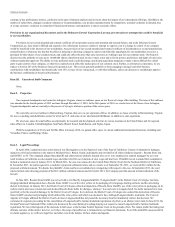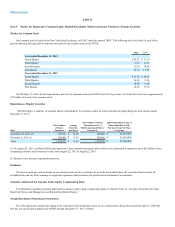Rosetta Stone 2013 Annual Report Download - page 23
Download and view the complete annual report
Please find page 23 of the 2013 Rosetta Stone annual report below. You can navigate through the pages in the report by either clicking on the pages listed below, or by using the keyword search tool below to find specific information within the annual report.
Table of Contents
Our software products must interoperate with computer operating systems of our customers. If we are unable to ensure that our products
interoperate properly with customer systems, our business could be harmed.
Our products must interoperate with our customers' computer systems, including student learning management systems of our enterprise and education
customers. As a result, we must continually ensure that our products interoperate properly with these systems. Changes in operating systems, the technologies
we incorporate into our products or the computer systems our customers use may damage our business.
Our Fit Brains products are based on research in the field of neuroscience. The goal of Fit Brains is to help improve concentration, enhance
memory and strengthen overall cognitive functions. If the validity of the associated neuroscience or the conclusions that we draw from it is
challenged, our reputation could be harmed and our business prospects and financial results could be materially and adversely affected.
We rely heavily on neuroscience to demonstrate that our products help to improve concentration, memory and overall cognitive functions, which involve
certain risks. In particular, our products are designed to develop key cognitive areas and help build stronger connections within the brain, also known as
cognitive reserve, may be unfamiliar to customers. Therefore, it may be difficult to convince customers about the effectiveness of our products. Our sales and
marketing efforts, as well as our reputation, could be adversely impacted if related areas of neuroscience are proven to be false.
If we are unable to successfully cross-sell Fit Brains' products to Rosetta Stone customers, our growth prospects could be adversely impacted.
As our product and service offerings become more complex, our reported revenue may become less predictable.
During 2013, we continued to transition our distribution to more online in the consumer business. The accounting policies that apply to these sources of
revenue may be more complex than those that apply to our traditional products and services. In addition, we may change the manner in which we sell our
software licenses, and such change could cause delays in revenue recognition in accordance with accounting standards. Under these accounting standards,
even if we deliver products and services to, and collect cash from, a customer in a given fiscal period, we may be required to defer recognizing revenue from
the sale of such product or service until a future period when all the conditions necessary for revenue recognition have been satisfied. If we move more of our
consumer business online we will also collect less cash from our initial transactions with consumers which could substantially decrease our revenues in the
short term. Conditions that can cause delays in revenue recognition include software arrangements that have undelivered elements for which we have not yet
established vendor specific objective evidence of fair value, requirements that we deliver services for significant enhancements or modifications to customize
our software for a particular customer or material customer acceptance criteria.
Many of our expenses are fixed and many are based, in significant part, on our expectations of our future revenue and are incurred prior to the
sale of our products and services. Therefore, any significant decline in revenue for any period could have an immediate negative impact on our
margins, net income and financial results for the period.
Our expense levels are based, in significant part, on our estimates of future revenue and many of these expenses are fixed in the short term. As a result,
we may be unable to adjust our spending in a timely manner if our revenue falls short of our expectations. Accordingly, any significant shortfall of revenue in
relation to our estimates could have an immediate negative effect on our profitability. In addition, as our business evolves, we anticipate increasing our
operating expenses to expand our product development, technical support, sales and marketing and administrative organizations. Any such expansion could
cause material losses to the extent we do not generate additional revenue sufficient to cover the additional expenses.
We may incur losses associated with currency fluctuations and may not be able to effectively hedge our exposure, which could impair our
financial performance.
Our operating results are subject to fluctuations in foreign currency exchange rates. We currently do not attempt to mitigate a portion of these risks
through foreign currency hedging, based on our judgment of the appropriate trade-offs among risk, opportunity and expense. In the future, we might choose to
engage in foreign currency hedging transactions. If the foreign currency hedging markets are negatively affected by clearing and trade execution regulations
imposed by the Dodd-Frank Wall Street Reform and Consumer Protection Act, the cost of hedging our foreign exchange exposure could increase.
We may need to raise additional funds to pursue our growth strategy or continue our operations, and we may be unable to raise capital when
needed.
From time to time, we may seek additional equity or debt financing to provide for the capital expenditures required to finance working capital
requirements, continue our expansion, develop new products and services or make acquisitions or other investments. In addition, if our business plans
change, general economic, financial or political conditions in our markets
22


